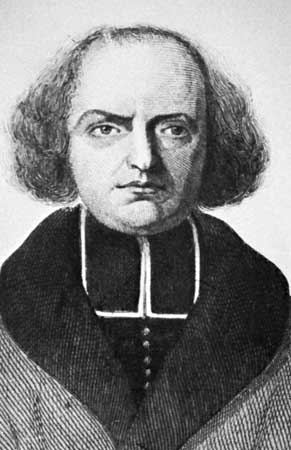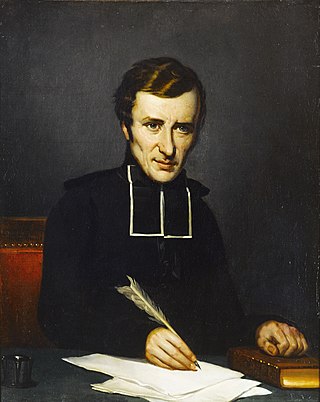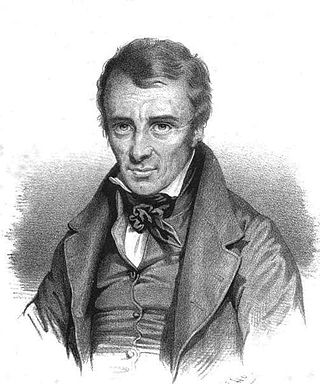
Jacques Paul Migne was a French priest who published inexpensive and widely distributed editions of theological works, encyclopedias, and the texts of the Church Fathers, with the goal of providing a universal library for the Catholic priesthood.

Charles-Forbes-René, comte de Montalembert was a French publicist, historian and Count of Montalembert, Deux-Sèvres, and a prominent representative of liberal Catholicism.

Louis Veuillot was a French journalist and author who helped to popularize ultramontanism.

Jean-Baptiste Henri-Dominique Lacordaire, OP, often styled Henri-Dominique Lacordaire, was a French ecclesiastic, preacher, journalist, theologian and political activist. He re-established the Dominican Order in post-Revolutionary France. Lacordaire was reputed to be the greatest pulpit orator of the nineteenth century.

Félicité Robert de La Mennais was a French Catholic priest, philosopher and political theorist. He was one of the most influential intellectuals of Restoration France. Lamennais is also considered the forerunner of both liberal Catholicism and Modernism.

The Second French Empire, officially the French Empire, was the government of France from 1852 to 1870. It was established on 2 December 1852 by Louis-Napoléon Bonaparte, president of France under the French Second Republic, who proclaimed himself Emperor of the French as Napoleon III. The period was one of significant achievements in infrastructure and economy, while France reasserted itself as the dominant power in Europe.

Édouard Adolphe Drumont was a French journalist, author and politician, most often remembered for his antisemitic ideology and animus. He initiated the Antisemitic League of France in 1889, and was the founder and editor of the newspaper La Libre Parole. After spending years of research, he synthesised three major types of antisemitism. The first type was traditional Catholic attitudes toward the alien "Christ killers" augmented by vehement antipathy toward the French Revolution. The second type was hostility toward capitalism. The third type was so-called scientific racism, based on the argument that races have fixed characteristics, and asserting that Jews have negative characteristics. His work played a key role in catalyzing the Dreyfus Affair.

Antoine-Frédéric Ozanam was a French Catholic literary scholar, lawyer, journalist and equal rights advocate. He founded with fellow students the Conference of Charity, later known as the Society of Saint Vincent de Paul. He was beatified by Pope John Paul II in the Cathedral of Notre-Dame de Paris in 1997. His feast day is 9 September.

Liberal Catholicism was a current of thought within the Roman Catholic Church influenced by classical liberalism and promoting the separation of church and state, freedom of religion in the civic arena, expanded suffrage, and broad-based education. It was influential in the 19th century and the first half of the 20th, especially in France. It is largely identified with French political theorists such as Felicité Robert de Lamennais, Henri Lacordaire, and Charles Forbes René de Montalembert influenced, in part, by a similar contemporaneous movement in Belgium.
Mirari vos, sometimes referred to as Mirari vos arbitramur, was the fourth encyclical letter of Pope Gregory XVI and was issued in August 1832. Addressed to "All Patriarchs, Primates, Archbishops, and Bishops of the Catholic World", it is general in its audience and scope, whereas his three earlier encyclicals had been addressed to more specific audiences in the Papal States and the Kingdom of Poland.
Neo-ultramontanism is the belief of certain Roman Catholics, primarily during the period immediately prior to the First Vatican Council, that papal infallibility was not restricted to a small number of papal statements but applied ipso facto to all papal teachings and statements.

Jean-Joseph Gaume was a French Roman Catholic theologian and author.
Events from the year 1800 in France.
The foreign relations between Pope Pius IX and France reflected Pope Pius IX's hostility to the French Third Republic's anticlerical politics, as well as Napoleon III's influence over the Papal States. But this did not prevent church life in France from flourishing during much of this pontificate.

L'Observateur français was a French daily Catholic newspaper published in Paris between 1887 and 1895.

The Ralliement refers to the policy adopted by some Catholics in France to support the French Third Republic following the publication of the papal encyclical Au milieu des sollicitudes on February 16, 1892, by Pope Leo XIII. Supporters of this position were called the Ralliés.

The Union nationale was a political movement in late 19th-century France characterized by its Catholic, nationalist, anti-Masonic, and antisemitic ideologies.

Eugène Veuillot was a French journalist who, alongside his brother Louis and later with his sons François and Pierre, directed the Catholic-oriented newspaper L'Univers.
Emmanuel-Joseph Bailly de Surcy (1794–1861) was a French printer and journalist. He played an active role in the Catholic revival in 19th-century France and dedicated his life to Catholic activism and pedagogy.
L'Avenir was a daily newspaper published in France starting on October 16, 1830. A journal of opinion, its subtitle described it as a "political, scientific, and literary journal," with the motto "God and liberty." It defended the ideals of liberal Catholicism and was condemned by the papal encyclical Mirari vos. The publication was suspended by its authors on November 15, 1831, and did not resume afterward.















